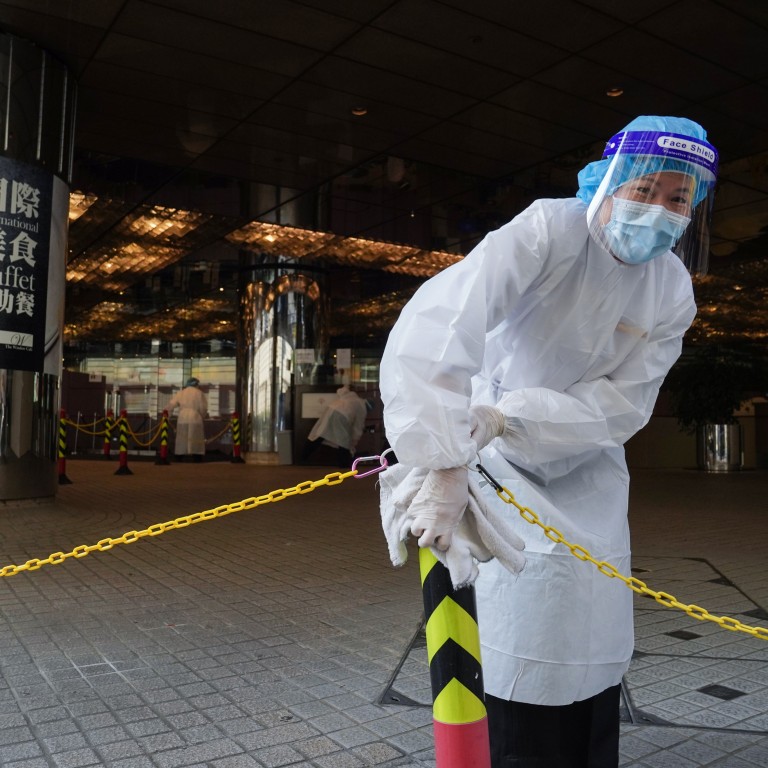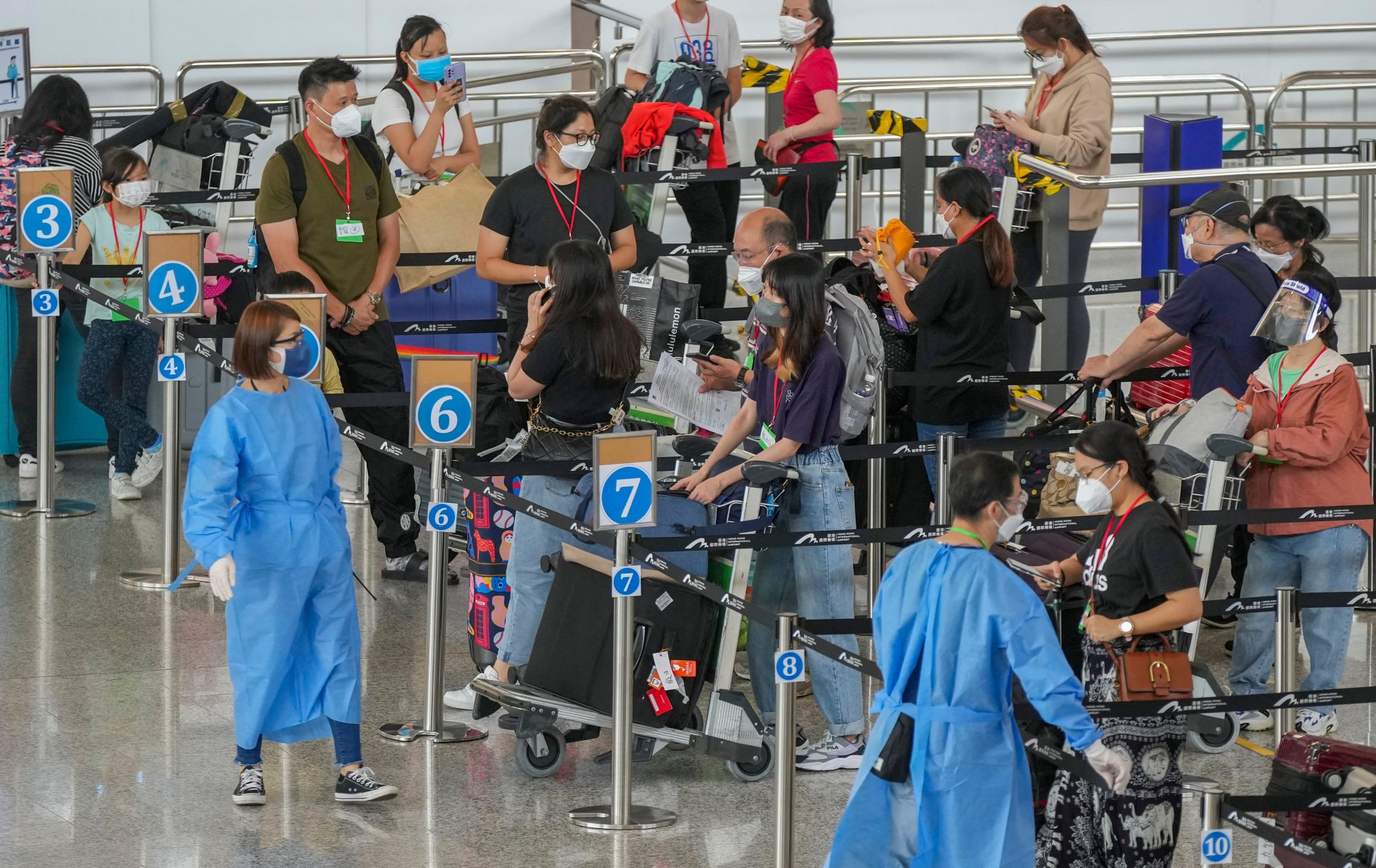
Coronavirus: Hong Kong may shorten hotel quarantine and introduce colour codes for infected patients and arrivals around same time
- The ‘3+4’ and ‘4+3’ plans, which would require arrivals to undergo either three days of hotel quarantine and four of home isolation or vice versa, are being discussed
- The policy change could come as authorities implement a red and yellow QR code system to better control movements of infected patients and arrivals
The “3+4” and “4+3” plans, which refer to combinations of days spent isolated at a hotel and at home, have been discussed by officials in recent days after a “5+2” plan was raised by health experts earlier this month.
But government insiders on Monday said it was still too early to give an exact date for implementing the change in quarantine policy, citing the need to further study a variety of health data, especially the number of arrivals who tested positive for Covid-19 on the third day of their hotel stay.

“The government is still digging into figures on whether the quarantine period at hotels should be shortened to just five days or could even further be shortened to four or three days,” a government source said.
Another insider familiar with policymaking said the health minister hoped to provide some “groundbreaking ideas” that would enable residents to travel more freely.
At the same time, authorities were putting the finishing touches on the two-colour health code system aimed at preventing people from leaving quarantine, and which the government could introduce in the coming weeks, at the earliest, sources said.
Health officials on Monday confirmed 4,130 Covid-19 cases, including 224 imported ones, and three additional deaths. The city’s coronavirus tally stands at 1,326,123 infections, with 9,472 related fatalities.
Hong Kong may adopt colour-coded app system for Covid-19 patients within weeks
The government is pushing to make the city’s vaccine pass system tied to the “Leave Home Safe” risk-exposure app more effective by identifying infected residents with a red QR code, barring them from public places, and giving arrivals in quarantine a yellow version, restricting their access to certain premises.
One source confirmed that the current working plan was that the yellow code would not cover close contacts of Covid-19 patients, as suggested by a government adviser on Sunday.
“Yellow is for restricting access during the period after the shortened hotel quarantine,” the insider said.
Respiratory medicine specialist Dr Leung Chi-chiu said the main concern with changing quarantine rules was whether doing so would allow Omicron subvariants, especially BA.5, to spread more easily in the community.
“As BA.5 has become the dominant strain globally, most of our imported cases will become BA.5 in near future,” he said. “Shortening the quarantine period will lead to their accelerated spread in our community.”
Medical experts have stressed that while the BA.5 subvariant is more transmissible than other stains, it does not cause more severe health complications than the other mutations.
Entertainment tycoon Allan Zeman said a change to the quarantine policy would be “refreshing” for businesses, as Hong Kong was getting a “bad reputation for its very stringent quarantine measures”.
“The goal is to achieve zero quarantine for us, but I understand we have to do it step by step,” he said. “If the government is willing to shorten the quarantine period to only three or four days at hotels, it would still be very good news.”
Tam Yiu-chung, Hong Kong’s sole delegate to the country’s top legislative body, said the city government could consider easing inbound quarantine rules as long as Covid-19 detection measures remained.
“We have to maintain infection control measures when loosening quarantine requirements,” he said, adding shortening hotel quarantine to three to four days, followed by home isolation was one possible way to further reopen the city.
Tam also expressed support for plans by the Hong Kong Rugby Union to hold the Sevens tournament this year, saying it would help the city reconnect with the international community.
Separately, the Hospital Authority announced staff at two more “high-risk” departments – the psychiatry and rehabilitative units – would have to take two polymerase chain reaction (PCR) tests every week, after the requirement was added for departments including oncology and haematology.
Dr Gladys Kwan, a chief manager of the authority, pledged that the bolstered screening requirements would not affect hospital services as the workload would be “manageable”.
What halt to Hong Kong’s Covid flight bans means for travellers, airlines
The authority was also considering requiring hospital visitors to present a negative PCR test result obtained within 48 hours before their arrival, a measure that care homes would adopt starting from August 1.
“PCR testing may cause inconvenience to family members of patients,” Kwan admitted. “But of course in situations where patients’ conditions are serious or require urgent visits from families, we will deal with it with flexibility. For example, they can do a rapid antigen test first and submit a PCR test result afterwards.”
But she sought to reassure the public that authorities had no plans to halt all visits to public hospitals, although outsiders would continue to be barred from wards with clusters of infections for the time being.
Health authorities also revealed 1,112 students and teachers tested positive via rapid tests between Saturday and Monday, resulting in a week-long suspension of some in-person classes at eight schools.
Additional reporting by Jess Ma


